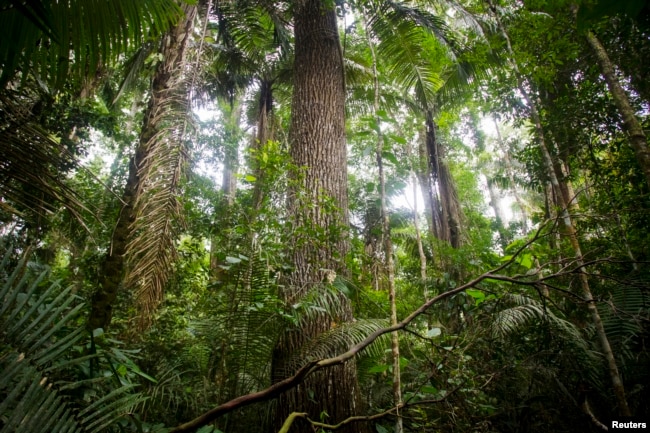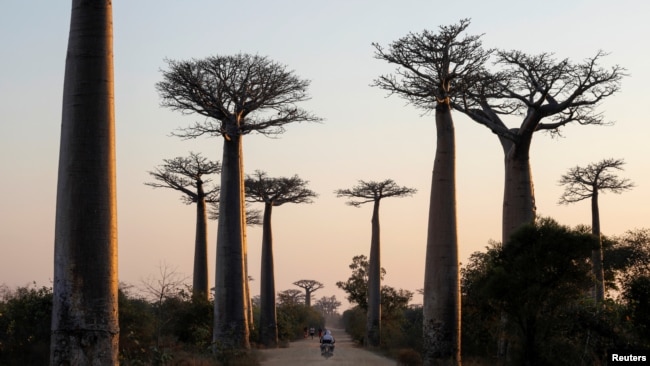”Unknown”という言葉には敏感に反応してしまいます。
しかし驚きました!!これほど多くあるとは思いませんでした。
”we need to learn about the Earth so that we can better protect it and conserve natural resources for future generations"
まさにその通りですね!!!
VOAで英語を学び、知識を深めましょう!!
研究成果:世界にはまだ多くの未知の樹木が(和訳)
Study: World Still Has Many Unknown Trees
February 06, 2022
ペルーからオーストラリア、マダガスカルからカリフォルニアまで、世界には素晴らしい樹種がたくさんあります。何種類あるのでしょう?新しい研究によると、約73,000種類の樹木があり、その多くはまだ発見されていないそうです。このような情報は、私たちが地球について学ぶことがいかに多いかを教えてくれる、と専門家は言っています。
世界最大の森林データベース
世界90カ国、10万カ所以上、4400万本以上の樹木を収録した世界最大の森林データベースを公開しました。
研究者はこのデータをもとに、地球には約73,300種の樹木があると推定しました。
この数字は、以前の推定値よりも約14%増加しています。このうち、約9,200種は数学的な予測に基づいて存在すると推定されますが、科学的にはまだ特定されていません。これらの樹木の多くは南米に生育していると研究者はいいます。
アマゾンの熱帯雨林やアンデスの森林を有する南米には、地球上の樹木種の43%が存在し、希少種も約8,200種と最も多いことが判明しました。
この研究は、イタリアのボローニャ大学のロベルト・カッツォーラ・ガッティが中心となって執筆し、最近、米国科学アカデミー紀要に掲載されました。
ガッティ氏は、樹木や森林は単に酸素を生産するだけではなく、環境の健全性に重要な役割を果たすと説明しています。
彼はまた、「私たちの社会は、森を単なる木材、木を天然資源と考えがちですが... 人類は木や森からインスピレーションやリラックス、精神性、そして本質的には生きる意味を得ているのです。とも述べています。
研究チームは、南米には約27,000種の樹木が知られており、まだ確認されていないものが4,000種あると推定しています。
研究チームは、世界の他の地域についても推定しています。
ヨーロッパとアジアには、約14,000の既知の種があり、2,000の未知の種があります。
アフリカは1万種、不明1000種、中米を含む北米は9000種、不明2000種、オーストラリアを含むオセアニアは7000種、不明2000種といいます。
Study: World Still Has Many Unknown Trees
From Peru to Australia, Madagascar to California, the world has many wonderful tree species. How many? A new study suggests there are about 73,000 kinds of trees, many of them still undiscovered. Such information reminds us of how much more we can learn about the Earth, experts say.
Largest forest database
Researchers recently revealed the world's largest forest database, one that is made up of more than 44 million trees at more than 100,000 locations in 90 countries.
Researchers used the data to estimate that Earth has about 73,300 tree species.
That number is about 14 percent higher than earlier estimates. Of that total, about 9,200 are estimated to exist based on mathematical predictions but have not yet been identified by science. Many of these trees grow in South America, the researchers said.
South America, home to the Amazon rainforest and Andean forests, was found to have 43 percent of the planet's tree species and the largest number of rare species, at about 8,200.
Roberto Cazzolla Gatti of the University of Bologna in Italy was the lead writer of the study that appeared recently in the publication Proceedings of the National Academy of Sciences.
Trees and forests are much more than just oxygen producers, Gatti said, explaining that they play an important part in the health of the environment.
He added, “Our society often considers forests as just pieces of wood and trees as natural resources... From trees and forests humanity gets inspiration, relaxation, spirituality and essentially the meaning of life.”
The research team estimated that South America has about 27,000 known tree species and 4,000 yet to be identified.
The team also had estimates for other areas of the world.
Europe and Asia have about 14,000 known species and 2,000 unknown species.
Africa has 10,000 known species and 1,000 unknown; North America including Central America has 9,000 known and 2,000 unknown; while Oceania including Australia has 7,000 known and 2,000 unknown.
Importance of the study
Study co-writer Peter Reich of the University of Michigan and University of Minnesota said that by measuring the number of trees "our study can contribute to tree and forest conservation efforts."
Conservation is a term that means the protection of plants, animals, and the natural environment.
Reich believes that "tree species diversity is key to maintaining healthy, productive forests, and important to the global economy and to nature."
He added that the information in the study “is important because tree species are going extinct due to deforestation and climate change, and understanding the value of that diversity requires us to know what is there in the first place before we lose it."
This study did not estimate the total number of individual trees globally. But 2015 research led by one of the co-authors put that number at about 3 trillion.
The new study identified global tree diversity hot spots in the tropics and subtropics in South America, Central America, Africa, Asia and Oceania. It also determined that about a third of known species can be classified as rare.
The researchers used methods developed by mathematicians to estimate the number of unknown species by using the numbers of known species. Tropical and subtropical areas in South America may have 40 percent of these yet-to-be-identified species, they said.
Jingjing Liang of Purdue University in Indiana was a co-writer of the study.
"This study reminds us how little we know about our own planet ….there is so much more we need to learn about the Earth so that we can better protect it and conserve natural resources for future generations," Liang said.
Words in This Story
species – n. biology : a group of animals or plants that are similar and can produce young animals or plants : a group of related animals or plants that is smaller than a genus
inspiration—n. something that makes someone want to do something or that gives someone an idea about what to do or create : a force or influence that inspires someone
relaxation – n. a way to rest and enjoy yourself
deforestation -- n. the act or result of cutting down or burning all the trees in an area

